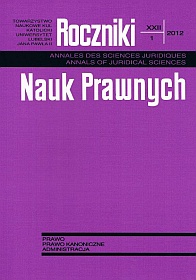The Understanding of the Principle of Sustainable Development in International Law
Abstract
The most popular definition of sustainable development is contained in the Report of the Brundtland Commission of 1987, according to which “sustainable development is development that meets the needs of the present without compromising the ability of future generations to meet their own needs". Although this definition is widely accepted, it still requires further discussion, which is the subject of the present study. This is partly due to the fact that understanding of the term “sustainable development” is not uniform in the literature – which some even consider a premise to reject the term.
The concept of sustainable development goes back to the 1970s. However, its beginnings may be seen even in earlier publications of the 1950s and 1960s. Some even think that this concept accompanies mankind from times immemorial – such a statement may be found in the reasons for the judgment in the case Gabčikovo-Nagymaros Project (Hungary/Slovakia) of 1997. In the separate vote it was stated that “sustainable development not only is a principle of modern international law; it is one of the oldest concepts in the history of mankind”. The face of the principle of sustainable development is different, depending on the place, in which it is carried out. Its constituents, that is social and economic development with preserving the environment are differently treated in developed countries and in developing ones. This variety of approaches effects the range of the understanding of the principle. It seems that this aspect of the principle should prevail that decides about the environmental protection – as the principle of sustainable development allows ensuring intergenerational equity in access to natural environment resources. However, this understanding does not always prevail. Hence, it seems that it is worth presenting different ways to define this concept that seems to be homogeneous.
Copyright (c) 2012 Roczniki Nauk Prawnych

This work is licensed under a Creative Commons Attribution-NonCommercial-NoDerivatives 4.0 International License.


